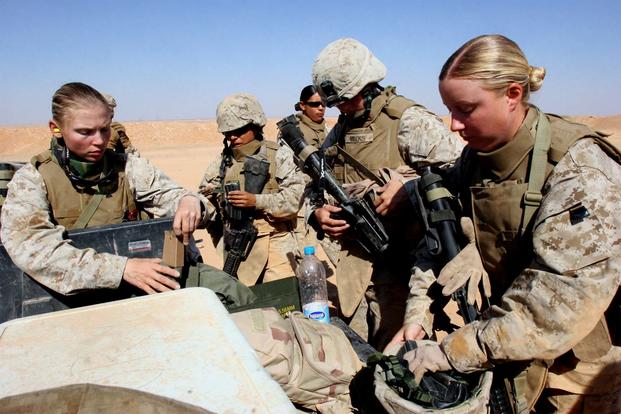
When it comes to gender politics, there are certain issues that come to mind and others that slip under the radar. These days, the most newsworthy issues involve things like diversity in popular media, discrimination in certain social spheres, attitudes within certain sub-cultures, and patterns of harassment.
I’ve explored some of these issues in the past, but only when I feel like there’s relevant discussion worth having. The problem with the issues that slip under the radar is that they rarely make headlines, which helps them persist. Even when a headline finally does come along, it’s difficult to discuss because most people aren’t aware of it and haven’t contemplated the implications.
A good example is military conscription. If you live in America, Canada, or Western Europe and are under the age of 40, chances are you haven’t given it a moment’s thought. Conscription, or the draft as it’s commonly known, is one of those institutions that just isn’t as relevant as it used to be. Considering how much war, in general, has declined in the past 50 years, that’s understandable.

However, it’s still relevant in the sense that it reflects old attitudes about society, war, and gender roles. These attitudes are rarely scrutinized, even among feminists, conservatives, liberals, and egalitarians. Now, thanks to recent developments in the courts, this might be a good time to discuss this often-overlooked issue.
If you’re an adult, able-bodied man, then this issue affects you. It has already affected me and almost every other man older than 18 years of age because that’s the age when we had to sign up for the Selective Service System. In doing so, we gave the government the information and discretion to draft us into military service, should the need arrive.
Make no mistake. This is not akin to getting a driver’s license or a social security card. By signing up for the Selective Service System, a sizable chunk of the male population is agreeing to go to war whenever their government decides to conscript them. It’s not a formality, nor is it done out of patriotism either.

Every man has had to learn what this emblem means.
It’s not just because doing so is necessary to access federal programs like student loans, job training, and Pell Grants. Failure to sign up for Selective Service is a felony, punishable by hefty fines and prison time. Logistically speaking, this is an issue in which consent truly doesn’t matter. Men have to do this. They are as subject to conscription as they are to paying taxes.
It’s one of the few issues in which the gender divide is clear cut. Men must permit the government to conscript them into military service. Women do not. While women are still free to join the military and enjoy its many benefits, they ultimately have a choice that men don’t. In the event of a war that requires conscription, they won’t be forced to join the fight.

Whether you’re a pacifist, egalitarian, or a radical feminist, this issue should matter because it has significant implications. It’s frequently cited as a case of male disposability and for good reason. The fact that only men must sign up for conscription implies that society is comfortable sending them to the front lines of a war. It affirms that we’re okay with men being brutalized, but not women, a double standard I’ve explored before.
While there are many historical reasons for this, ranging from ancient warrior cultures to evolutionary factors to the pragmatism of protecting the gender that bears the babies, those reasons don’t carry as much weight anymore. Most countries, including the United States, rely on a voluntary service system and several decades of civil rights movements have made gender discrimination illegal.
However, the Selective Service System managed to escape all these changes until very recently. In February 2019, a federal court issued a groundbreaking ruling that concluded the Military Selective Service Act was unconstitutional. This quote from the ruling nicely sums up the reasoning behind that ruling.
In short, while historical restrictions on women in the military may have justified past discrimination, men and women are now “similarly situated for purposes of a draft or registration for a draft.”
While it’s likely that this ruling will be contested, it does provide an opportunity for a more nuanced discussion. Most debates regarding gender tend to focus on areas where women and transgender individuals face discrimination and marginalization. These debates have certainly made their share of headlines, but military conscription is unique in its impact on men.

That might be part of the reason why conscription rarely arises in a gender debate, but with this ruling, the time is right to address it. There’s no denying the discrimination here. Men are being forced to do something at the behest of their government and women are not. This issue reflects a major disparity, but it’s also an opportunity.
Even though military conscription hasn’t been practiced in the United States for several decades, it has already played a significant role in shaping society. A big reason why the civil rights movement made so much progress in the 1950s and 1960s is because conscription required people of various races and backgrounds to work together. In many respects, the structure of the military was a huge equalizer.
This is nicely depicted in the opening scenes of “Full Metal Jacket.” Gunnery Sergeant Hartman made it abundantly clear to every recruit that there’s no discrimination in his unit. Your race, ethnicity, and background didn’t matter in the slightest. In a war, it can’t matter. It’s a powerful message that many soldiers brought back with them.

The face of true unity.
That sort of message has never been applied to gender in the United States. It’s not unprecedented, though. There are a number of countries that have mandatory military service for both men and women. Israel, one of America’s closest allies, is one of them. While they tend to serve different roles, the fact that they’re subject to the same obligations as men sends a powerful message.
It doesn’t just show in the status that women have in Israel have, especially when compared to other neighboring nations. It establishes equal expectations for women and men, alike. In a system where everyone is held to a similar standard when defending their country, it’s harder to justify discrimination.
That has significant implications for the United States in wake of the ruling. Either the Selective Service System must be thrown out entirely or women must be subject to the same requirements. As recently as 2016, Congress debated the idea of including women in the system, but it did not pass. The fact that it sparked few protests is revealing, in and of itself.

By not acting through legislation, the courts are forcing the issue. The Justice Department is already opposing the ruling by claiming that requiring women to register for the draft is “particularly problematic.” That’s somewhat ironic, given that similar rhetoric is used when feminists criticize video game characters for being too sexy.
Despite that rhetoric, it’s just as telling that there are few protests surrounding this statement. The same protesters who marched in Washington DC back in 2017 have been relatively silent in how the government views gender disparity with respect to military conscription. This isn’t a right. It’s a responsibility and one that can unify a society full of diverse people.

To some extent, it’s understandable why those same protesters don’t argue for the same standards with respect to military conscription. Unlike Israel, the United States and most western countries don’t have mandatory military service and the draft hasn’t been utilized in 40 years. For most people, it doesn’t directly affect them.
However, that might also make it the perfect issue for unifying people from both ends of gender issues. If feminists and men’s rights activists are serious about equality in terms of the law and societal standards, then military conscription is a clear-cut issue that they can both rally behind. Either you’re for equality or you’re not. At the very least, it would be helpful to know who’s not.


